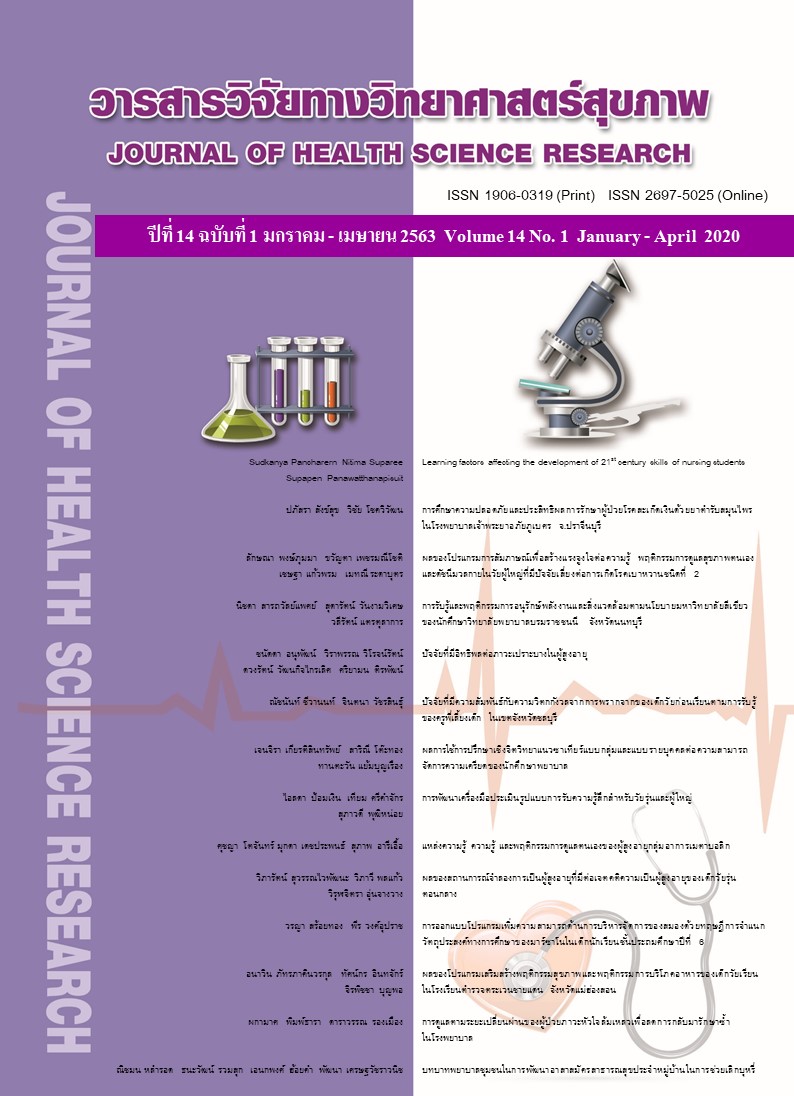ผลของโปรแกรมการสัมภาษณ์เพื่อสร้างแรงจูงใจต่อ ความรู้ พฤติกรรมการดูแลสุขภาพตนเอง และดัชนีมวลกายในวัยผู้ใหญ่ที่มีปัจจัยเสี่ยงต่อการเกิดโรคเบาหวานชนิดที่ 2
Main Article Content
บทคัดย่อ
บทนำ: การสัมภาษณ์แบบสร้างแรงจูงใจเป็นกลยุทธ์หนึ่งที่ส่งเสริมให้ประชาชนกลุ่มเสี่ยงต่อการเกิดโรคเบาหวานชนิดที่ 2 มีพฤติกรรมการดูแลตนเองอย่างเหมาะสม
วัตถุประสงค์การวิจัย: เพื่อศึกษาประสิทธิผลของโปรแกรมสัมภาษณ์เพื่อสร้างแรงจูงใจต่อระดับความรู้ พฤติกรรมการดูแลสุขภาพตนเองและดัชนีมวลกายในวัยผู้ใหญ่ที่มีปัจจัยเสี่ยงต่อการเกิดโรคเบาหวานชนิดที่ 2
วิธีการวิจัย: วิจัยกึ่งทดลองชนิดศึกษากลุ่มเดียววัดผลก่อนและหลัง กลุ่มตัวอย่างเป็นผู้ใหญ่ที่มีปัจจัยเสี่ยงต่อการเกิดโรคเบาหวานชนิดที่ 2 ในพื้นที่ตำบลบ้านสวน อำเภอเมือง จังหวัดชลบุรี จำนวน 30 คน เข้าร่วมโปรแกรมการสัมภาษณ์เพื่อสร้างแรงจูงใจพัฒนาขึ้นตามแนวคิดของ Miller & Rollnick ใช้เวลา ครั้งละ 1-2 ชั่วโมง อย่างต่อเนื่อง จำนวน 5 ครั้ง เป็นระยะเวลา 10 สัปดาห์ เครื่องมือที่ใช้ในการเก็บข้อมูลประกอบด้วยแบบวัดความรู้ และแบบสอบถามพฤติกรรมการดูแลสุขภาพตนเองเกี่ยวกับโรคเบาหวาน มีค่าความเชื่อมั่นของเครื่องมือเท่ากับ .767 และ .826 ตามลำดับ วิเคราะห์ข้อมูลโดยใช้สถิติเปรียบเทียบ paired t-test
ผลการวิจัย: หลังเข้าร่วมโปรแกรมการสัมภาษณ์เพื่อสร้างแรงจูงใจ กลุ่มตัวอย่างมีคะแนนเฉลี่ยความรู้เรื่องโรคเบาหวาน และพฤติกรรมการดูแลสุขภาพตนเองสูงกว่าก่อนเข้าร่วมโปรแกรมอย่างมีนัยสำคัญ (p<.01) และยังพบว่ากลุ่มตัวอย่างมีค่าเฉลี่ยดัชนีมวลกายต่ำกว่าก่อนเข้าร่วมโปรแกรมอย่างมีนัยสำคัญทางสถิติ (p<.01)
สรุปผล: ผลการศึกษาแสดงถึงประสิทธิผลของโปรแกรมสัมภาษณ์แบบสร้างแรงจูงใจในการปรับเปลี่ยนพฤติกรรมสุขภาพ ควรนำไปใช้ในประชากรกลุ่มเสี่ยงต่อการเกิดโรคเบาหวานชนิดที่ 2 และกลุ่มเสี่ยงต่อการเกิดโรคไม่ติดต่อเรื้อรังต่อไป
Downloads
Article Details
บทความที่ได้รับการตีพิมพ์เป็นลิขสิทธิ์ของวิทยาลัยพยาบาลบรมราชชนนี จังหวัดนนทบุรี
ข้อความที่ปรากฏในบทความแต่ละเรื่องในวารสารวิชาการเล่มนี้เป็นความคิดเห็นส่วนตัวของผู้เขียนแต่ละท่านไม่เกี่ยวข้องกับวิทยาลัยพยาบาลบรมราชชนนี จังหวัดนนทบุรี และคณาจารย์ท่านอื่น ในวิทยาลัยฯ แต่อย่างใด ความรับผิดชอบองค์ประกอบทั้งหมดของบทความแต่ละเรื่องเป็นของผู้เขียนแต่ละท่าน หากมีความผิดพลาดใด ๆ ผู้เขียนแต่ละท่านจะรับผิดชอบบทความของตนเองแต่ผู้เดียว
เอกสารอ้างอิง
Turi KN, Buchner DM, Grigsby-Toussaint DS. Predicting Risk of Type 2 Diabetes by Using Data on Easy-to-Measure Risk Factors. Prev Chronic Dis. 2017;14:160-244.
Chia DB, Wong LY, Liu DYK, Toh MPHS. Predictive factors of developing type 2 diabetes mellitus, Acute Myocardial Infarction and stroke in a cohort with Impaired Fasting Glucose in Singapore. Diabetes Res Pract .2017;132:59-67.
Sompan A, Terathongkum S, Piaseu N, Sakunhongsophon S. Factors predicting diabetes preventive behavior in persons with pre-diabetes. Ramathibodi Nursing Journal. 2015;21(1):96-109. (in Thai).
Kaewsringam P, Nirattharadorn M, Wattana C. Factors predicting type II diabetes mellitus preventive behaviors among people at risk for diabetes. Journal of Nursing Science Chulalongkorn University. 2015;.27(2)119-31. (in Thai)
Chinsom J, Senaruk W. Type 2 diabetes risk in middle-aged Isaan women: a case study of urban community. Journal of Nurse Association of Thailand North-Eastern Division. 2011.29(1):31-40. (in Thai).
Wongthaicharoen P, Juthamas H, Suttithatip S. Effects of motivational interviewing group counseling in health behavior and level of cholesterol of hypertensive patients. Ratchaphruek Journal. 2015.13(3):91-102. (in Thai).
Miller W.R. & Rollnick S. What is motivational interviewing?: Behav Cogn Psychother. 1995;23:325-34.
Leelapattanapanit J, Phunopas A. The result of the motivational interviews and interpreting measurements of body mass to modify behavior in obese with waist circumference outsize. Udontani Hospital Medical Journal. 2017;25(2):113-19. (in Thai).
Sarakhwan W. Effect of counseling program applying motivational interview technique and health belief model on weight loss behavior of the employees of Quality Construction Product Co., ltd (Thailand. Journal of Preventive Medicine Association of Thailand. 2014;4(3):226-33. (in Thai)
Ban Suan Health Promoting Hospital. Annual Report for the year 2017. No. 12/2017; Thursday, 14 December 2017; At the meeting room. Ban Suan Health Promoting Hospital;2017. (in Thai).
Pittathano S. Effects of motivational interviewing based counseling on controlling body mass index of patients with type II Diabetes Mellitus. Research article presented at the national academic conference entitled "Integrated Methodology: Social Media and Management" organized by the Faculty of Management Science Silpakorn University in collaboration with the Center for Media and Communication Studies University of the Thai Chamber of Commerce at Novotel Hua Hin Cha-am Beach Resort and Spa. 22 March 2013. Available from http://www. Amsar thailand.utcc.ac.th /attachments/article/34/14%20Sudtanom%20thai.pdf. (in Thai).
Cohen J. Statistical power analysis for the behavioral science. (2nd ed.). Hillsdale, NJ: Lawrence Erlbaum Associates; 1988.
Pongprapapan P. and faculty. The development of a health promotion model of diabetic patients in Wat Puranawas community. Bangkok: Bangkok Thonburi University; 2010. (in Thai).
Miller WR, Rollnick S. Motivation interviewing: preparing people for change. New York: Guilford Press; 2002.
Kaewfong I, Wannapornsiri C, Naewbood S. Effective of motivational interviewing program on knowledge, attitude, behaviors and lipid levels among hypertensive patients. Boromarajonani College of Nursing Uttaradit Journal. 2018;10(2):57-71. (in Thai).
Waker C.L. Effects of Motivational Interviewing on Diabetes Self-Management Behaviors and Glycemic Control in Type 2 Diabetes: A Translational Study GraduateSchool of the University of Cincinnati in
partial fulfillment of the requirements for the degree of Doctor of Philosophy in the College of Nursing. [Internet]. 2012. [cited 2015 February 22]. Available from: http://www.proquestco.uk /en-UK.
Rosenbek LK, Wagner L, Lonvig EM, Hjelmborg J, Henriksen JE. The effect of motivational interviewing on glycemic control and perceived competence of diabetes self-management in patients with type 1 and type 2 diabetes mellitus after attending a group education programme: a randomized controlled trial, Diabetologia, [Internet]. 2011 [cited 2015 January 14]. Available from: http:// www. springer.com/ medicine/nternal/journal/125
Nokkaew J. The effect of nursing program for motivation in yoga practice on body mass index. and blood glucose levels in overweight type 2 diabetic patients. (Master of Nursing Thesis). Graduate School, Songkhla: Prince of Songkla University; 2015. (in Thai).
Wuttijureepan A, Moolsart S,
Tipkanjanaraykha K. The effectiveness an enhancing motivation program in weight reduction via electronic communication in obese nursing students. Journal of Health and Nursing Research. 2019;35(2):57-70.
(in Thai).


